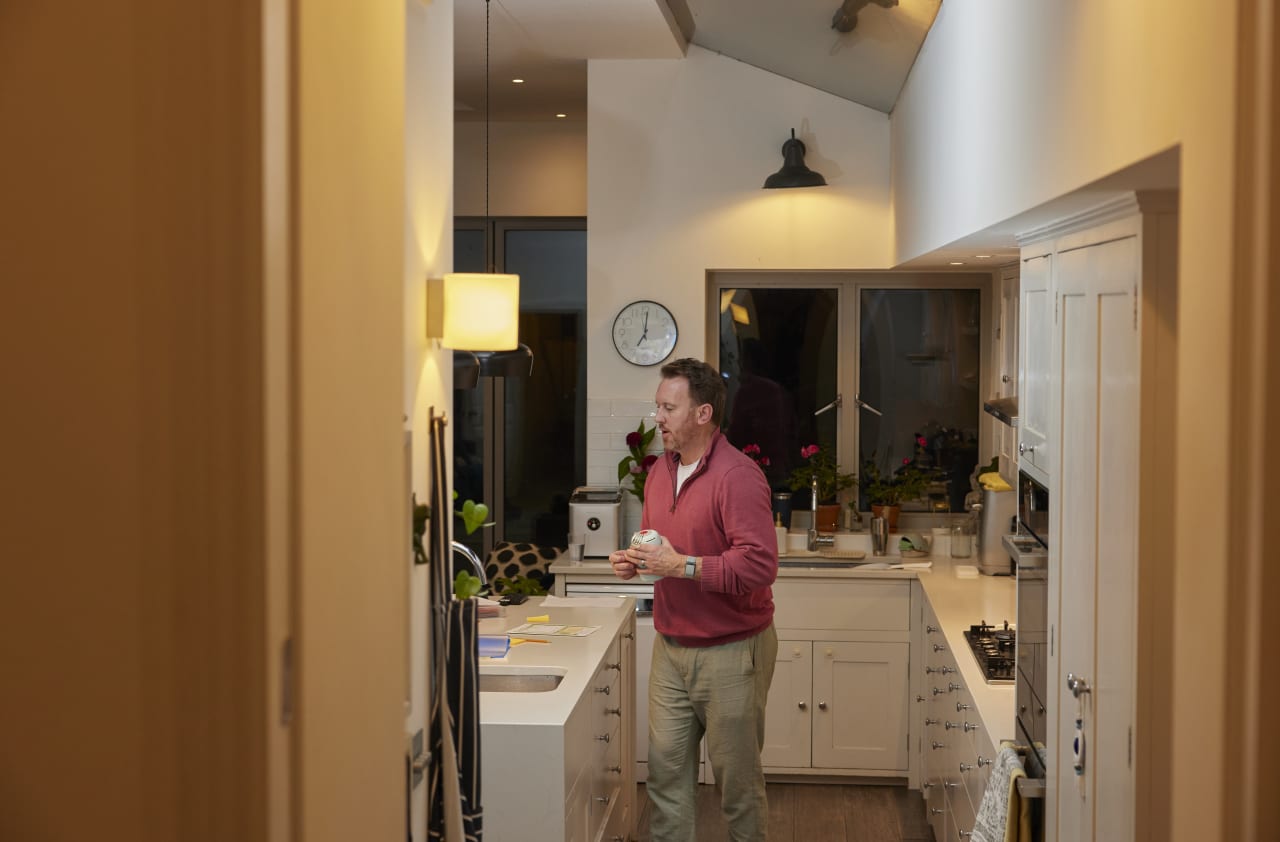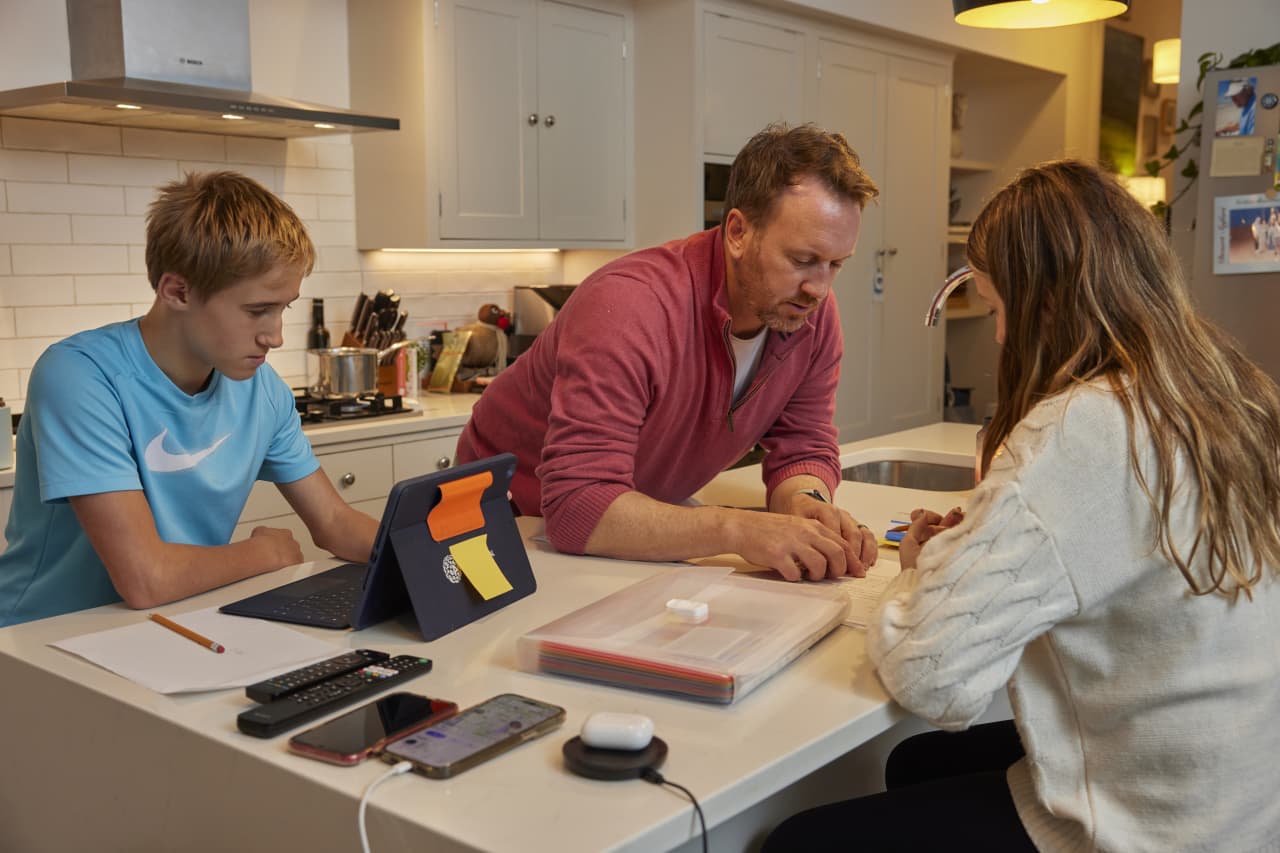Behind Many Powerful Women on Wall Street: A Doting ‘Househusband’
More men are staying home to facilitate the complex juggle of family life and their wives’ high-powered careers
Suzanne Donohoe , a top executive at the private-equity firm EQT , started the month of September with a 10-day business trip through Asia and Europe. Back in New York, her husband, Matt Donohoe , was helping their three teenagers begin a new school year.
That was no simple task. Though the Donohoe children are close in age, each goes to a different school and has different extracurricular activities. Matt drove their 13-year-old to hockey practices in New Jersey and took all three children to Boston for a tournament. In between, there were groceries to buy, meals to prepare and homework to assist with.
It was all in a day’s work for Matt, who quit his job in 2007 to help out at home. A former emerging-markets trader with degrees from Georgetown and Columbia, he is part of a quiet but growing force of men who hold down the fort at home while their wives climb to the upper echelons of finance.
Wall Street has long struggled to elevate and retain women. A hotly competitive industry that demands long hours, frequent travel and the need to be on call constantly, it has been an unwelcoming environment for women, particularly those with children.
Women who have leadership roles in finance say that having a spouse who stays home—a househusband, if you will—can relieve that burden and allow them to rise. Even these privileged women, who have a spouse at home and often extra help beyond that, say maintaining the arrangements is a complex feat.

For the men, being a househusband can come with a stigma: Society often still assumes men will be the bigger earners and women the primary caregivers. But that is starting to change.
In 45% of U.S. opposite-sex marriages, the wife earns as much as or more than her husband, a share that has roughly tripled over the past 50 years, according to a 2023 report from Pew Research Center. Dads represented 18% of stay-at-home parents in 2021, up from 11% in 1989, another Pew study found.
There are now househusbands at the highest levels of power. Doug Emhoff , married to Democratic presidential nominee Kamala Harris, gave up his career—as an entertainment lawyer—to facilitate her political rise after she was elected vice president. On Wall Street, the list of women with husbands at home includes the chief executives of Citigroup and TIAA, the chief financial officer of the private-equity firm Vista Equity Partners, and the global co-head of Blackstone’s real-estate business, among others.
Senior female executives whose partners also work say they have to manage an intense balancing act and admit to being envious at times of their peers whose husbands don’t work.
“The prototype of the person you are competing with, the people in nearly all of the successful positions, have a stay-at-home partner,” says Suzanne Donohoe, who was a partner at Goldman Sachs and KKR before joining EQT in 2022. “The disheartening part of the message is somehow you can’t achieve if one parent isn’t at home.”
She says she doesn’t think that is the case and knows and admires people in demanding jobs who make it work with neither spouse at home.
‘Safety net for a trapeze artist’
Many couples say they started out with parallel professions but reached a point at which the woman’s career accelerated. When one person needed to devote more time to parenting, it made more sense for it to be the man.
Chip Kelly was working in tech sales at an international startup in 2009 when his wife, Natalie Hyche Kelly, who is a Visa executive, gave birth to their first child. After the couple didn’t move quickly enough to get a spot at the daycare they wanted, Chip volunteered to care for the baby and work while she slept.
He took calls while pushing their daughter in the stroller. When she went to sleep, he worked through dozens of emails. The couple had twins a few years later. Around that time, Natalie was promoted and started commuting to San Francisco four days a week from Charlotte, N.C., where the Kellys lived. Chip tried to work while caring for the twins and their older daughter when she wasn’t in preschool.
After the family moved to San Francisco, Chip realised that he was neither doing his job nor parenting as well as he wanted to. He decided to devote himself full time to the latter.
“It was kind of becoming a no-brainer because my wife’s career was going so well,” he says.
The Kellys are now starting their third year in London, where Natalie serves as the payments company’s chief risk officer for Europe. Chip considered going back to work a few years ago, but so far has decided against that because his family relies on his being at home.

“I’m like the safety net for a trapeze artist,” he says. “You don’t think about it unless they take it away.”
Kathleen McCarthy Baldwin, Blackstone’s global co-head of real estate, was nursing her second child in 2015 when her husband, Matt Baldwin, left his job as the CFO of a research firm and decided to take some time off.
“The idea of him not working made me very anxious, mostly because of my fears about what it would do to our marriage,” she says. “Would I be envious that he had more time with the children? Would he resent that I had this really exciting and demanding job?”
Matt told her he wasn’t worried. After spending a summer with their daughters at the Jersey Shore while Kathleen mostly worked in the city, Matt decided to make the change permanent.
These days, he rises at 5:30 a.m., before the rest of the house is awake. He makes oatmeal for the family four mornings a week, giving himself one morning off. On most days, Kathleen takes the girls to school while Matt goes indoor rock climbing.
After school, he and their nanny divide the responsibilities, with one taking the older daughter to sports practice, drama and guitar lessons and the other transporting the younger one to swimming lessons, violin and dance. Matt, who has become a skilled cook, usually makes dinner. Specialties include salmon, soft-cooked eggs and spicy pasta.
Kathleen says her husband’s decision to stay home created the flexibility for her to pursue other interests outside work, such as serving on the board of an anti-hunger nonprofit.
“When I talk with other women in this position, we all say our husbands are a very special breed,” she says. “They don’t define themselves by their jobs.”
Awkward moments
Not all men are as comfortable in the position.
One stay-at-home dad whose wife works in private wealth at an investment bank says he sometimes tells other men that he manages real estate—technically true because the family owns a few buildings. He says he can identify other men in his position at private-school functions when they say they “manage investments” or “run a boutique hedge fund.”
“We’re all out there, but we can’t say anything about it,” he says.
Paul Sullivan has been trying to change that. He founded a group called the Company of Dads after leaving his job as a columnist for the New York Times in 2021. Sullivan’s wife runs an asset-management firm and became very busy with work after the Covid-19 pandemic.
Sullivan already defined himself as what he dubs a “lead dad,” the go-to parent for everything from playdates and doctors’ appointments. But he found no support groups for men in his position. He reached out to senior female executives and asked them about the idea of creating one. They approved. Some said their husbands didn’t help enough. Others said their husband’s friends made fun of them, calling them names like “Mr. Mom.”
“Two things can be true at once,” Sullivan says. “Moms can be discriminated against in the workplace, and dads can be afraid to take a lead role at home.”
Sullivan now organises events for lead dads such as a Father’s Day beer fest and a March Madness get-together. He gives talks at workplaces and hosts a podcast on which he interviews therapists, parenting coaches and fatherhood advocates. He counts the husbands of Goldman Sachs partners, JPMorgan Chase managing directors and top law partners among his members.
For the Donohoes, having Matt at home has meant that he has developed a close bond with his children. Suzanne says it has given her credibility with her colleagues when she needs to attend one of their doctor’s appointments or sporting events.
There are still mix-ups. Schools often call Suzanne first if one of the children is sick or needs permission to do something even though Matt is listed first on contact forms. Once it happened when she was in London on business. She gently asked the school administrator to call her husband. He was at their apartment five minutes away.
 Copyright 2020, Dow Jones & Company, Inc. All Rights Reserved Worldwide. LEARN MORE
Copyright 2020, Dow Jones & Company, Inc. All Rights Reserved Worldwide. LEARN MORE
A divide has opened in the tech job market between those with artificial-intelligence skills and everyone else.
A 30-metre masterpiece unveiled in Monaco brings Lamborghini’s supercar drama to the high seas, powered by 7,600 horsepower and unmistakable Italian design.
A divide has opened in the tech job market between those with artificial-intelligence skills and everyone else.
There has rarely, if ever, been so much tech talent available in the job market. Yet many tech companies say good help is hard to find.
What gives?
U.S. colleges more than doubled the number of computer-science degrees awarded from 2013 to 2022, according to federal data. Then came round after round of layoffs at Google, Meta, Amazon, and others.
The Bureau of Labor Statistics predicts businesses will employ 6% fewer computer programmers in 2034 than they did last year.
All of this should, in theory, mean there is an ample supply of eager, capable engineers ready for hire.
But in their feverish pursuit of artificial-intelligence supremacy, employers say there aren’t enough people with the most in-demand skills. The few perceived as AI savants can command multimillion-dollar pay packages. On a second tier of AI savvy, workers can rake in close to $1 million a year .
Landing a job is tough for most everyone else.
Frustrated job seekers contend businesses could expand the AI talent pipeline with a little imagination. The argument is companies should accept that relatively few people have AI-specific experience because the technology is so new. They ought to focus on identifying candidates with transferable skills and let those people learn on the job.
Often, though, companies seem to hold out for dream candidates with deep backgrounds in machine learning. Many AI-related roles go unfilled for weeks or months—or get taken off job boards only to be reposted soon after.
Playing a different game
It is difficult to define what makes an AI all-star, but I’m sorry to report that it’s probably not whatever you’re doing.
Maybe you’re learning how to work more efficiently with the aid of ChatGPT and its robotic brethren. Perhaps you’re taking one of those innumerable AI certificate courses.
You might as well be playing pickup basketball at your local YMCA in hopes of being signed by the Los Angeles Lakers. The AI minds that companies truly covet are almost as rare as professional athletes.
“We’re talking about hundreds of people in the world, at the most,” says Cristóbal Valenzuela, chief executive of Runway, which makes AI image and video tools.
He describes it like this: Picture an AI model as a machine with 1,000 dials. The goal is to train the machine to detect patterns and predict outcomes. To do this, you have to feed it reams of data and know which dials to adjust—and by how much.
The universe of people with the right touch is confined to those with uncanny intuition, genius-level smarts or the foresight (possibly luck) to go into AI many years ago, before it was all the rage.
As a venture-backed startup with about 120 employees, Runway doesn’t necessarily vie with Silicon Valley giants for the AI job market’s version of LeBron James. But when I spoke with Valenzuela recently, his company was advertising base salaries of up to $440,000 for an engineering manager and $490,000 for a director of machine learning.
A job listing like one of these might attract 2,000 applicants in a week, Valenzuela says, and there is a decent chance he won’t pick any of them. A lot of people who claim to be AI literate merely produce “workslop”—generic, low-quality material. He spends a lot of time reading academic journals and browsing GitHub portfolios, and recruiting people whose work impresses him.
In addition to an uncommon skill set, companies trying to win in the hypercompetitive AI arena are scouting for commitment bordering on fanaticism .
Daniel Park is seeking three new members for his nine-person startup. He says he will wait a year or longer if that’s what it takes to fill roles with advertised base salaries of up to $500,000.
He’s looking for “prodigies” willing to work seven days a week. Much of the team lives together in a six-bedroom house in San Francisco.
If this sounds like a lonely existence, Park’s team members may be able to solve their own problem. His company, Pickle, aims to develop personalised AI companions akin to Tony Stark’s Jarvis in “Iron Man.”
Overlooked
James Strawn wasn’t an AI early adopter, and the father of two teenagers doesn’t want to sacrifice his personal life for a job. He is beginning to wonder whether there is still a place for people like him in the tech sector.
He was laid off over the summer after 25 years at Adobe , where he was a senior software quality-assurance engineer. Strawn, 55, started as a contractor and recalls his hiring as a leap of faith by the company.
He had been an artist and graphic designer. The managers who interviewed him figured he could use that background to help make Illustrator and other Adobe software more user-friendly.
Looking for work now, he doesn’t see the same willingness by companies to take a chance on someone whose résumé isn’t a perfect match to the job description. He’s had one interview since his layoff.
“I always thought my years of experience at a high-profile company would at least be enough to get me interviews where I could explain how I could contribute,” says Strawn, who is taking foundational AI courses. “It’s just not like that.”
The trouble for people starting out in AI—whether recent grads or job switchers like Strawn—is that companies see them as a dime a dozen.
“There’s this AI arms race, and the fact of the matter is entry-level people aren’t going to help you win it,” says Matt Massucci, CEO of the tech recruiting firm Hirewell. “There’s this concept of the 10x engineer—the one engineer who can do the work of 10. That’s what companies are really leaning into and paying for.”
He adds that companies can automate some low-level engineering tasks, which frees up more money to throw at high-end talent.
It’s a dynamic that creates a few handsomely paid haves and a lot more have-nots.
Now complete, Ophora at Tallawong offers luxury finishes, 10-year defect insurance and standout value from $475,000.
A luxury lifestyle might cost more than it used to, but how does it compare with cities around the world?





















